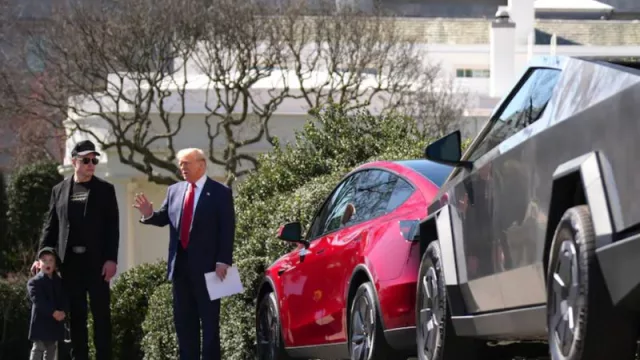Executive Summary & Key Takeaways:
Trump's backing of Musk amidst the Tesla boycott offers a unique perspective on how leaders can influence brand and market perceptions. Companies must learn to navigate these turbulent waters with proactive communication strategies, image diversification, and a deep understanding of the market. Reflecting on these events invites us to consider how, as consumers and entrepreneurs, we can contribute to a more resilient and ethical business environment.
On Tuesday, the President of the United States, Donald Trump, announced his intention to purchase a new Tesla vehicle, a symbolic act of unwavering support for his ally and visionary leader of the electric automotive industry, Elon Musk. This declaration comes amid a whirlwind of protests under the slogan "Boycott Tesla" and a significant drop in the company's stock price.
"Elon Musk is risking everything for our nation and doing a FANTASTIC JOB! However, the radical left extremists, true to their modus operandi, are trying to illegally boycott Tesla, one of the world's automotive giants and Elon's 'baby,' with the sole aim of attacking him and undermining everything he stands for," Trump declared on his Truth Social platform Monday night. He added that he would buy "a brand new Tesla on Tuesday as a powerful demonstration of confidence and support for Elon Musk, a true American patriot."
Musk, in turn, expressed his gratitude to the president for his support via his social media platform, X.
The White House later confirmed that the U.S. President plans to go through with the Tesla purchase, and it could happen as early as today. Spokeswoman Karoline Leavitt announced that "a Tesla is on its way" to the presidential residence and that the president will personally inspect it.
"Journalists will have the opportunity to witness this significant act of support today," Leavitt asserted with determination.
Follow us on IG: @infonegociosmiami
Context and Analysis of the Situation
President Donald Trump's endorsement of Elon Musk and Tesla amid a boycott that caused a 15.4% drop in the company's stock highlights the intersection of politics and business in the 21st century. This event not only affects Tesla but also offers valuable lessons for any company operating in a globalized and politicized environment.
Impact on the Market
"On Monday, Tesla's stock fell by 15.4%, bringing the year-to-date losses in 2025 to 45%. This decline occurred after a post-election surge, driven by expectations of benefits from the close relationship between Musk and Trump. However, Musk's increasing involvement in politics and his association with far-right groups have raised concerns among investors, negatively impacting Tesla's brand perception."
Communication and Marketing Strategies
"In response to the boycott, Trump declared he would buy a Tesla as a show of support for Musk, whom he called 'a true great American.' This action, though symbolic, can have a significant impact on public perception and the market. For companies in similar situations, it's crucial to diversify their brand image and not rely solely on a public figure."
**Follow us on IG: @infonegociosmiami**
Lessons for the Business and Marketing Sector
The Tesla case underscores the importance of resilience and adaptability in the business world. Companies must be prepared to face crises that affect not only their financial performance but also their reputation. Proactive communication, constant market monitoring, and the ability to pivot strategies are essential to overcoming these challenges.
Illustrative Data and Examples
Since its all-time high of $1.5 trillion on December 17, Tesla's market capitalization has more than halved. This decline reflects not only market fluctuations but also the volatility associated with the brand's public perception. Protests in Portland and New York, as well as Tesla owners placing stickers on their vehicles, demonstrate the direct impact of politics on consumer behavior.
Frequently Asked Questions (FAQs):
Q: How can a company effectively handle a boycott?
A: A company can effectively handle a boycott through transparent and proactive communication, diversifying its brand image, and quickly adapting to changes in market perception.
Q: What impact can a political figure's endorsement have on a company?
A: A political figure's endorsement can have a dual impact: on one hand, it can increase visibility and support among certain market segments; on the other hand, it can alienate other groups, negatively affecting the brand's perception.
Q: How can Tesla owners manage the stigma associated with the brand?
A: Tesla owners can manage the stigma associated with the brand through personal communication, demonstrating their commitment to the company's values, and, if necessary, distancing themselves from the controversial actions or statements of its leaders.
Subscribe to Infonegocios Miami
https://infonegocios.miami/suscribite-al-newsletter
-
Contact Infonegocios MIAMI:












Tu opinión enriquece este artículo: